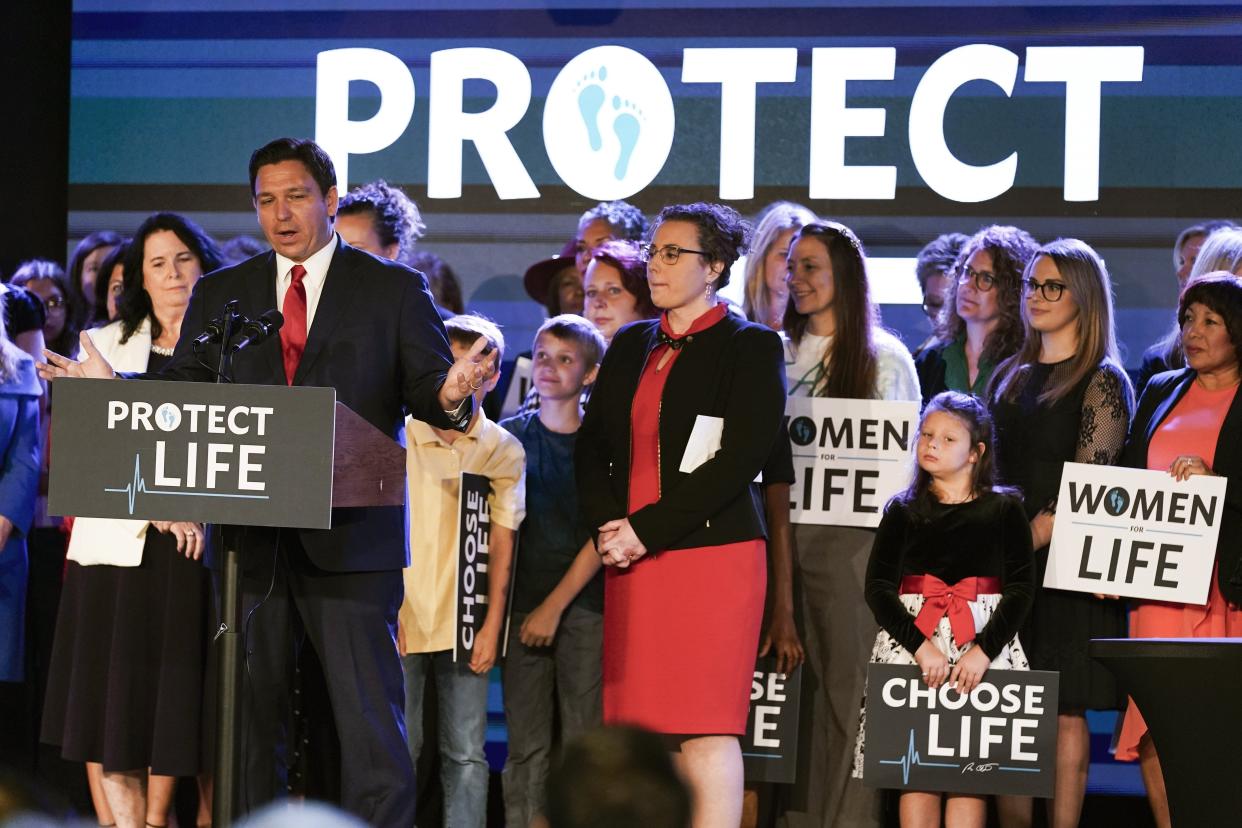Ending Roe v. Wade shouldn't curb Florida privacy rights

- Oops!Something went wrong.Please try again later.
In its haste to rid society of abortions, the U.S. Supreme Court appears headed toward weakening a very important constitutional guarantee against undue government interference. The Florida Supreme Court shouldn't make that same mistake.
Our state constitution guarantees a right to privacy, a standard used by previous Florida Supreme Court justices to protect abortion. The current court is far more conservative, and abortion rights advocates worry that the justices could re-interpret the privacy amendment and erode a legal bulwark in further restricting abortions.
"Because having safe access to abortion is what the Florida Constitution provides for and is what Floridians prefer, opponents of abortion have no route through a ballot initiative or through the Legislature to constitutionally restrict that access," Daniel Tilley, legal director for the American Civil Liberties Union of Florida told USA Today Network — Florida. "Their only route is instead through the Florida Supreme Court, which is the only entity that can interpret, with finality, Florida constitutional law."
FOR SUBSCRIBERS: Florida's constitution protects abortion access — for now
Last week, a leaked draft of a majority opinion from the U.S. Supreme Court signaled the likely end of Roe v. Wade, a 49-year-old ruling that established the constitutional right to an abortion. The protection relied on the 14th Amendment's due process clause that promotes the "right to privacy." Since that right was an interpretation by justices and not spelled out in the Constitution, the current conservative majority on the court felt justified in ending federal abortion protections.
Abortion isn't the only "right" not mentioned in the Constitution. Access to contraceptives, and the right to gay and interracial marriage, also rely on judicial interpretation, which has many worried that those rights also will be targeted.
Florida's Constitution, in Article 1 Section 23, spells out "the right to be let alone and free from governmental intrusion into a person's private life." Voters approved that amendment more than 40 years ago by a 60% margin. The only exceptions to that privacy wall to date are efforts to circumvent the state's public records and open meetings laws. Further abortion restrictions could open the door to more damaging exceptions.
As a candidate, Gov. Ron DeSantis supported a fetal heartbeat bill that would have prohibited a physician from performing an abortion if a heartbeat was detected. As governor, he approved a law that requires parental consent before a minor can have an abortion. More recently he signed legislation that outlaws the procedure after 15 weeks of pregnancy, joining other Republican-led states that expected the U.S. Supreme Court to set similar restrictions in a Mississippi case.
Related Commentary: Florida remains the petri dish of right-wing policy | Editorial
It's now clear that the U.S. Supreme Court's conservative majority wants a restriction even tighter than 15 weeks, leaving abortion opponents downright giddy that their half-century quest to outlaw all abortions is coming to a favorable end. The anti-abortion organization, Florida Voice for the Unborn, for example, was quick to issue a press release asking Gov. DeSantis to include a bill that would prohibit nearly all abortions in Florida during the upcoming special session of the Florida Legislature, initially called to address the property insurance crisis.
And yet, Republicans are reacting to the high court's leak like the proverbial dog that chased a speeding car and finally caught it. There's no celebrating a hard-fought victory, because a wide majority of Florida voters support choice.
Instead, the National Republican Senatorial Committee, chaired by Sen. Rick Scott of Florida, is using poll-tested data to advise Republicans how to come across as compassionate consensus builders, while castigating Democrats for being extremists and lying about Republican views on abortion and women's health. Even Gov. DeSantis, usually pugnacious on issues that help him politically, demurred when asked by reporters if he would include abortion in this month's special session.
The reality is, the opposition from a riled electorate is mounting. Poll after poll shows a majority of Americans believe the U.S. Supreme Court should uphold Roe v. Wade. The sentiment is the same in Florida, where a recent Public Opinion Research Lab at the University of North Florida poll found 57% oppose the state's 15-week abortion ban.
In a post-Roe world, the Florida Supreme Court will ultimately decide on future abortions. The smart play would be to respect court precedent and avoid a legal ruling that allows further abortion restrictions but invites additional incursions by state lawmakers into the lives of Floridians. We need our justices to lead, not follow.
— This editorial represents the opinion of the Palm Beach Post Editorial Board, which is comprised of its executive editor, editorial page editor and editorial writer.
This article originally appeared on Palm Beach Post: Editorial: Restricting abortions in Florida tests privacy rights

